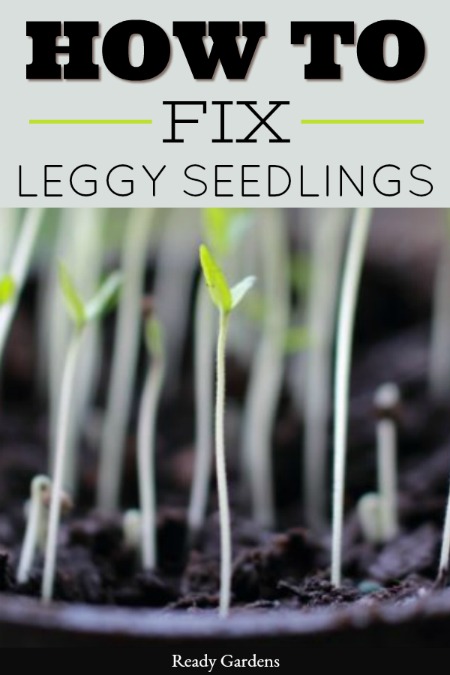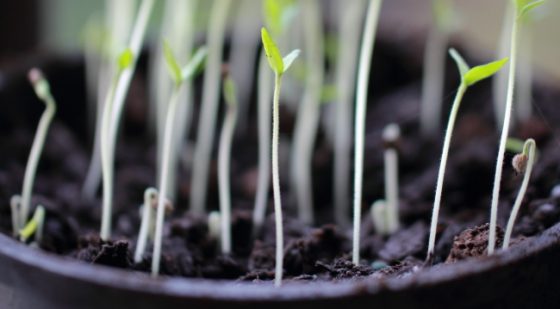There is little more satisfying than getting to watch your newly planted seeds begin to emerge from the dirt. After one week goes by, you will begin to notice your seedlings are getting leggy and barely able to hold themselves up, If that happens, this guide will help you understand what went wrong and how to fix it.
Leggy plants tend to be weaker, and they often flop and fall over. They will also produce fewer flowers and create an untidy spindly appearance. There are problems with leggy plants too. For starters, they often can’t stand up as well to natural occurrences such as wind and harsh rain. They will have a more difficult time growing up to be the strong plants we want them to be as well, and they tend to fall over enough that they become prone to diseases and pests that would otherwise not be a concern.
Why Do Plants Get Leggy?
There could be a few reasons, or all of the following combined could be an issue in making your plants too leggy:
- Lack of sunshine – Usually, this is the culprit. The natural reaction is for a plant to grow towards the light. If there isn’t enough light or the light source is too far away, the plant will stretch itself toward the light source in order to try to produce the necessary sugars to sustain itself. It accelerates its height in order to survive and as a result, you’ll get some long and floppy seedlings.
- Lack of moisture in the soil – Seedlings can also become leggy and grow weak if the soil (seed raising mix) dries out or is of poor quality. Dry soil keeps the seedlings from accessing the nutrients they require to grow strong stems and leaves. This means they are literally starving.
- High Temperatures – High heat can also be a cause of some leggy seedlings. The heat will cause a rapid growth spurt that will, in turn, cause an unbalanced growth. The stems will grow faster than the leaves in this case and can occur in hot weather indoors too if the temperature in your home is too high.
How To Fix Leggy Seedlings/Plants
Because having leggy plants can affect the production of flowers and perhaps even your food, you’ll want to take action and remedy the situation as soon as you can. Try any or all of the following to help your little plants thrive:
- Ensure enough light – The first thing you’ll want to do is make absolutely certain your plants are getting enough sunlight. Windowsills may not provide your seedlings with the light it needs to grow adequately. Using a grow light will help your plants receive the sunlight it needs. Of course, we do not always have this option, so if all you have is a sunny window area, place the seedlings in a south-facing window for maximum sunlight exposure. Or, as discussed, you could supplement the light the seedlings are getting from the window with a small fluorescent bulb placed a few inches from the plants. There are some great tips in the article linked here on how to have an effective and productive indoor winter garden, including suggestions on light sources. If your seedlings are mature enough to be transplanted, try planting them in an outdoor, but protected area, to sun harden them for a few days. This will get them ready for their eventual move to your big outdoor garden!
- Trickery – You can also “trick” your little seedlings into growing thicker stems. Try brushing your hands over them a few times a day, or place them near an oscillating fan that will blow gently on them. This will trick your plants into growing thicker stems by simulating a windy environment. In a windy area, plants need a thicker stem to withstand the wind and this will help yours release chemicals in the plant that will help that stem strengthen.
- Add some moisture – If your soil lacks quality or moisture, try simply watering more often. It’s pretty easy to set yourself a reminder on your phone to do a “daily seed moisture check.” Adding small amounts of water to a shallow tray or container can help young plants get the moisture they need from the bottom up. But keep in mind that too much water can be a bad thing too. Be mindful of the amount of water you give your plants. You don’t want the roots to rot from too much water. Keeping a spray bottle handy and giving the plants a few sprays each day can be beneficial and help keep you from overdoing it!
- Add more nutrient-rich organic material – adding more nutrients via organic compounds in the soil can also help ensure your little plants are getting the nutrients they need. If you have trouble finding high-quality soil, you can easily make your own!
All of these simple fixes can have your leggy seedlings or plants well on their way to a healthy and strong life! Take care of your plants and they will take care of you.

Read more gardening guides and shop for heirloom seeds over at Ready Gardens!
This article was originally published at Ready Nutrition™ on February 12th, 2019








Good article! I’ve had these problems. I’ll know what to look for now.
Thanks.
Not very helpful article. There are 3 basic reasons seedlings become leggy. They are over crowding , the plants are not getting enough light, and they are kept too wet. Also the type of fertilizer they receive is important. Urea or ammonium forms of nitrogen will cause stretch in seedlings. As will too much phosphorus.
If you want short healthy seedlings sow your seed with ample distance between them. Grow in full light conditions and do not over water them.
That’s what the article said ya twit
you can also take a leggy plant and replant it up to the leaves the stem then grows roots
Like this idea.
Well I found this article very helpful, it must be nice to have the space to grow seeds indoors, giving the seeds everything that helps them grow.